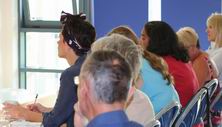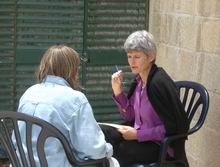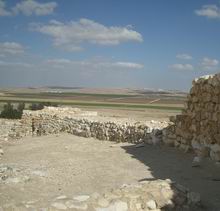Closing the Divide
A serious divide between key factions of the Church has been evident for at least half a century. It has been the  trigger for unpleasant, heated doctrinally-based name-calling, outright disdain between major groups and the reason for the clickish fragmentation, obvious to the world, that prevails among the brethren.
trigger for unpleasant, heated doctrinally-based name-calling, outright disdain between major groups and the reason for the clickish fragmentation, obvious to the world, that prevails among the brethren.
Yet, at its core, this divide has tapped issues surrounding today’s move of God in the marketplace.
Central to these seemingly volatile matters of division, have been issues even closer to God’s heart, issues impacting maturity within the Body, affecting the mobilization and unity of the Body, matters impeding the Body being able to strategically respond to the times upon us.
Early in my walk with the Lord, I was exposed to foundational biblical truths that some considered simplistic. Yet, they were Bible and they were foundational. The messages that resulted had great appeal to everyday people. Many were drawn from poor sectors of society. with words of hope that raised the bar for them not only spiritually, but offering the prospect of improving their socio-economic status and purpose in their community.
Simultaneously, among the many being drawn to these messages of hope and purpose were professionals and people of business and leaders. Across the board, from every strata of society, were those who were finding deep relevance in these basic biblical truths and putting their faith into action, while meeting with others to pray about these purposeful dimensions in God that were deeply stirring their hearts.
In the process, God was raising the bar with the prospect of something more than a cookie-cutter slice of what most accepted as standard Christianity.
Challenging the Status Quo
So it was that the Charismatic revival and the zeal and fervor it engendered, also seemed to provoke the ire of some  within more traditional sectors of the Body. That is what happens when the status quo is challenged. Yet, great fruitfulness came with the change as new believers were being attracted to the household of faith. For example, since 1967, more Jews have become acquainted with their Jewish Messiah than have since the time of Jesus’ resurrection and this time in 1967.
within more traditional sectors of the Body. That is what happens when the status quo is challenged. Yet, great fruitfulness came with the change as new believers were being attracted to the household of faith. For example, since 1967, more Jews have become acquainted with their Jewish Messiah than have since the time of Jesus’ resurrection and this time in 1967.
Unfortunately, there were abuses and misfires, resulting from those who stepped over boundaries they shouldn’t have, as there were also those who operated as charlatans and deceivers.
Yet, from those foundations has come a maturing of the Body and a burgeoning, global move of God in the marketplace that is currently underway. Dry, stubborn tradition is slowly being swept away by the restoration of biblical thinking and the power of the Spirit that is being witnessed on every corner of the globe. The result is closing the divide which has impeded the unity and strategic response being required by the volatility of the times.
Foundational Issues
There are few who question the importance of addressing the needs of the poor. The shift underway reflects the mobilization of marketplace leaders who are now taking their positions as spiritual and entrepreneurial mentors, giving hope to not just a next generation but to the lower socio-economic levels who still are reaching to break the bondages of poverty and in so doing, reaching for that purposeful “something more” in their destinies. A dear and long-term friend of mine from the early 1960s, a very accomplished and successful business leader and member of a traditional segment of the Body, now spends meaningful hours each week mentoring new Christians from his city’s barrios and inner city.
The shift underway also reflects the fact that publishing today is no longer just print, but combines online, offline, social media and events. With that has come an upgrade of the messages trickling down from the current genre of the Christian publishing world into the messages of the pulpit and the world of live-streaming and videos. Historically, since the days of the 1960s and the advent of the para-church movement, the majority of Christian publishing messages have targeted a sixth grade level. That is changing.
As the Body has matured, so has the level of the messages being given. In a juncture in time to when people are  driven by the simplicity of twitter messages, talking points and sound bytes, there is a depth emerging among the mature and among people of influence that genuinely gives focus to the big picture and transcends the over-simplified sound bytes.
driven by the simplicity of twitter messages, talking points and sound bytes, there is a depth emerging among the mature and among people of influence that genuinely gives focus to the big picture and transcends the over-simplified sound bytes.
With this depth has come the restoration of even deeper foundational issues and the enduring strategies that are wrapped up in what the Lord is mobilizing within the Body today globally.
Moses wrote, reflecting the heart of God: “There should be no poor among you.” There is an obligation among the community of believers. That obligation is one that raises the bar. Feeding the poor is a real, but temporary fix. At issue is what those who are able can do to eliminate the problem.
Since the fall of man the struggle has been between idolatry and the resulting poverty and corruption — and God and a tz’dakim, righteous people who engender the opportunity for others to prosper. That is what was meant when Moses outlined premises of the faithful in Deuteronomy 28: of being the head and not the tail. Then Jesus came and unlocked the truths that were there all the time. This reflected a different way of thinking, the way of the Kingdom, of being a culture within the surrounding cultures, that really had its foundations in the words of Moses, David and the prophets.
In doing so, He challenged what He referred to as the traditions and precepts of men.
In other words, the traditionalists had gotten stuck. It was in their way of thinking and viewing God and the issues at  hand: poverty and corruption. In the 1960s one of the popular books of the day was titled “The Organization Man.” It described a corporate culture of the blind leading the blind, a dutiful follower mind-set. The message was just follow your leaders and success will come to the faithful. That thinking has influenced many in the Church. There is nothing new under the sun.
hand: poverty and corruption. In the 1960s one of the popular books of the day was titled “The Organization Man.” It described a corporate culture of the blind leading the blind, a dutiful follower mind-set. The message was just follow your leaders and success will come to the faithful. That thinking has influenced many in the Church. There is nothing new under the sun.
So, Jesus raised the bar. He warned the people to go ahead and do what they heard the religious hypocrites say, just don’t do what they do, because they have become a part of the problem rather than the solution. That raises the question of our response to authority.
Renewed Thinking and Authority
I often ask myself about ones I’m working with: “Would I take this person with me into combat?” With over two years of hard combat under my belt, I know it is not blind obedience, but rather the cost paid for the discipline to have the right thinking at the right time that understands how to flow within the context of group authority.
At its heart, this type of response to authority involves discipline and bonding and getting beyond yourself. It takes maturity and it involves trust.
God is the ultimate source of authority. True leadership is not about being in charge, but rather in giving of yourself  to the benefit of the group. So it requires getting beyond yourself and what Jesus described as leading by serving. In combat, this involves the group operating in oneness or unity, which is vital for survival in combat. The independence and heroics of Rambo is a Hollywood fiction. The “Rambo illusion” applauds the role of second guessers during times of crisis.
to the benefit of the group. So it requires getting beyond yourself and what Jesus described as leading by serving. In combat, this involves the group operating in oneness or unity, which is vital for survival in combat. The independence and heroics of Rambo is a Hollywood fiction. The “Rambo illusion” applauds the role of second guessers during times of crisis.
Second guessers are ones who have problems with authority. In the reality of combat, they tend to get people they serve with killed.
Spiritually, second guessers are always learning and never coming to the knowledge of the truth. I once had an interpreter who was intellectually quite smart but still very young and naïve in the faith. This person epitomized the words of Jesus when He said: “Why do you call me Lord and do not do what I say?” Jesus was describing second guessers, skeptics among His followers who liked their ears tickled intellectually, but never took the steps to get to making the changes needed that would be foundational to walk out their destinies.
Jesus then illustrated His point with the example of those who came to him and failed in the discipline of putting His words into action. They were like a house built without a foundation, which would then collapse when the least of floods came through. What is on the surface may look good, but without the foundation, it won’t have a chance against the tough challenges of life.
A New Brand of Leadership
On issues of leadership within the Body, we don’t need to be led by eggheads who can’t see the forest for the trees. Nor do we need leaders who operate with egos bigger than themselves. Jesus unveiled the brand of leadership that marked the true heroes of faith: servant leadership that truly operates in oneness with God. Jesus punctuated this point with the words: “If you abide in Me and My words abide in you, you will ask whatever you will and it will be done.” This is the cost. The condition for such answers to prayer is our oneness with His Spirit and His truth.
Coming back to these foundations will change our thinking. When Jesus said we would be in the world, but not of the world, He was making a very Jewish statement. It involves our place in the world as a culture within a culture. Our cultural identity is to be as a people of God. That results in a shift in our thinking.
 As a people of God, God has gifted us and anointed us for a purpose. That purpose conforms to the calling God gave Abraham, to be blessed in order to be a blessing. God had something more for Abraham. After telling Abraham to leave the familiarity of his surroundings, God then promised him that through Abraham and his descendants through Isaac, all the families of the earth would be blessed. That is not only BIG thinking, it is a responsibility we as believers now share in being grafted into Abraham’s down-line. (Romans 15).
As a people of God, God has gifted us and anointed us for a purpose. That purpose conforms to the calling God gave Abraham, to be blessed in order to be a blessing. God had something more for Abraham. After telling Abraham to leave the familiarity of his surroundings, God then promised him that through Abraham and his descendants through Isaac, all the families of the earth would be blessed. That is not only BIG thinking, it is a responsibility we as believers now share in being grafted into Abraham’s down-line. (Romans 15).
This BIG thinking begins by understanding that as a people, we are not only a culture within a culture, but as such, we should not be dependent on our surrounding culture, but rather be self sufficient within the community of God’s people.
Self-Sufficiency
Self-sufficiency is the strategy necessary for the community of God’s people to survive as a culture within a culture. The temptation over the years has been to “be like everyone else” and to assimilate. Self sufficiency within the household of faith is what protects us from being like everyone else and as a people of God, losing our identity by being absorbed and assimilated.
To accomplish this goal requires big thinking and unity and maturity within the community of believers. It calls for the full biblical practice of righteousness, of tz’dakah, which is operational community generosity and responsibility. It goes back to the practice of not just feeding the poor, but giving a helping hand to the poor — teaching them to fish so to speak rather than just feeding them and making them dependent on you. That is why independent businesses among God’s people is so important.
Within the work we have been doing in mobilizing God’s economy within Asian settings have been both business and pastoral leaders establishing educational initiatives. One is a self-supporting private school. Another involves an extended home-school program supported by the profits from two independent businesses. A third is an orphanage that has just taken the first steps to acquire a plot of land that will have as its goal to make the orphanage self-supporting. Each of these models have been drawn from Abraham.
pastoral leaders establishing educational initiatives. One is a self-supporting private school. Another involves an extended home-school program supported by the profits from two independent businesses. A third is an orphanage that has just taken the first steps to acquire a plot of land that will have as its goal to make the orphanage self-supporting. Each of these models have been drawn from Abraham.
Abraham ran a God-centered, entrepreneurial community. A key facet of the book of Deuteronomy are the principles on how to run a God-centered, entrepreneurial community. It is the spiritual, the entrepreneurial and the community all operating in unison.
These are the dynamics that were being birthed and began operating during the early stages of what is today’s move of God in the marketplace. Trust operated at the core of those who were a part of agendas reflecting this model. Renowned social economist Frances Fukuyama has found that in societies with high trust levels, prosperity among the people is higher. In societies with lower trust levels, poverty levels are higher.
Which brings us to the point of the shift that is currently underway. The Jewish dynamic of community generosity (tz’dakah), which lends a helping hand to help its members establish themselves and become self-sufficient is now being seen emerging within true Kingdom practitioners, successful business people in the church with a grasp of these age-old biblical principles. This growing focus employing this model is closing the divide.
The Shift
The shift that began with messages targeting the poor, to give opportunity to raise the socio-economic levels of the less fortunate is now being embraced by almost every segment within the Body. As the Church grows into the maturity reflecting the deepest levels of God’s heart, those reaching out to the poor and needy from within business circles are setting the pace, enabling opportunity for the spiritually hungry who are embracing the reality of God as fuel is added to the dynamic of mobilizing a people who are blessed to be a blessing.
The Jewish community has long put such things into practice and as a result in most Jewish communities, the standard of living is higher than among those around them. There is a reason for this. Stephen Pease, a Presbyterian, wrote a compelling book titled “The Golden Age of Jewish Achievement” describing the amazing disproportionate achievement of the Jews in business, technology, the media and their positive impact on society as a whole.
 That impact is now being embraced across the board as a standard and a priority in the Church as God matures the Body and mobilizes leaders from within the marketplace.
That impact is now being embraced across the board as a standard and a priority in the Church as God matures the Body and mobilizes leaders from within the marketplace.
The Apostle Paul wrote: “As their faith grows so you will be enlarged even more.” It is a principle of the Kingdom. The more generous you are, the more you will be enlarged. The more blessing you bestow, the more the blessings will multiply back upon you.
Short-sighted critics indicate that this is a prosperity doctrine. It could be said that if Jesus had wanted us to prosper He would have said: “Give and it will be given unto you, good measure, pressed down, shaken together and running over will men give back to you. For with the measure you give out, so it will be given back to you.”
Oh, actually He did say that. It is a principle of the Kingdom: generosity triggers enlargement.
Let me illustrate this shift underway with the work we have been doing in Vietnam. Ten years ago our program targeted primarily the poor with the practical and community principles of entrepreneurship. In our follow-up work we have learned of many who attended these sessions who acted on what we said with successful startups. Step by step those who acted reaped results that exceeded their expectations, raising their socio-economic status along with the leadership roles they have played in being blessed to be a blessing within their communities.
Recently, we conducted three more of our workshops in Vietnam. In each case they were groups organized and led by business and professional people. High ratios of those attending these practical gatherings already operated successful businesses and wanted more on “how to do business the Kingdom way” and “how to use their talents and resources to build the community” and extend the blessings they were receiving to not only other members of the household of faith, but to be a light shining on a hill that would help the less fortunate and attract the world as a result.
Closing the Divide
So, the divide that has blemished the Church for far too long is being narrowed. The unity sought is not a form of doctrinal purity or elitism, but rather touching the deepest parts of God’s heart and putting the words of Jesus into action as doers of His words.
The common ground involves committed believing entrepreneurs and leaders — those with unique callings modeled

This is a caption
after Joseph and Daniel, who bear positive influence in the secular arenas of the world. These are the people who wield the blessings and authority of God who are reaching out and enabling opportunity for the poor and needy and challenging the thinking of the status quo with innovation and kindness.
These are those who are known as people of God by non-believers because they demonstrate the reality of God by truly making a difference that helps people. They are ones who bring change that is not defined by sound bytes and superficialities but by the results that everyday people can see.
These are those who are BIG-thinking people whose eyes are on the future and who will be remembered because of their kindness and generosity. They are the ones who provide safe places for those reaching for God and reaching for that something more in God.
They comprise the new breed of believing entrepreneurs and leaders coming to the forefront across the globe during a time marked by just the opposite — distrust and clamor and confusion. They are emerging on every continent, from among every ethnic group. There is a world around them that has been eagerly awaiting their arrival and the reality of God they exhibit.
___________________________________________________
Morris Ruddick has been a forerunner and spokesman for the higher dimensions of business leadership since the mid-90s. As founder of Global Initiatives Foundation and designer of the God’s Economy Entrepreneurial Equippers Program, Mr. Ruddick imparts hope and equips economic community builders to be blessed to be a blessing where God’s light is dim in diverse regions around the globe.
He is author of “The Joseph-Daniel Calling;” “Gods Economy, Israel and the Nations;” “The Heart of a King;” “Something More;” “Righteous Power in a Corrupt World;” “Leadership by Anointing;” and “Mantle of Fire,” which address the mobilization of business and governmental leaders with destinies to impact their communities. They are available in print and e-versions from www.Amazon.com, www.apple.com/ibooks and www.BarnesandNoble.com.
Global Initiatives Foundation (www.strategic-initiatives.org) is a tax-exempt 501 (c) 3 non-profit whose efforts are enabled by the generosity of a remnant of faithful friends and contributors whose vision aligns with God’s heart to mobilize economic community builders imparting influence and the blessings of God. Checks on US banks should be made out to Global Initiatives and mailed to PO Box 370291, Denver CO 80237 or by credit card at http://strategicintercession.org/support/
Likewise, email us to schedule a seminar for your group’s gathering on the Joseph-Daniel Calling or on anointing the creative in business.
2017 Copyright Morris Ruddick — info@strategic-initiatives.org
Reproduction is prohibited unless permission is given by a SIGN advisor. Since early 1996, the Strategic Intercession Global Network (SIGN) has mobilized prophetic intercessors and leaders committed to targeting strategic-level issues impacting the Body on a global basis. For previous posts or more information on SIGN, check: http://www.strategicintercession.org

